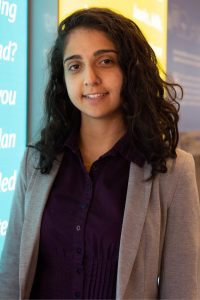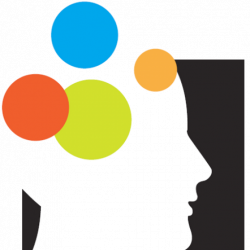By: Kevin Feng and Diana Kholmatova

Major: Psychology Honors
Year: 4th Year
Hometown: Iran
Preferred pronouns: She/Her
Fun Fact: I have a pet bird. I’m on campus right now so I don’t live with him currently. I can’t get work done if he’s around, so it’s nice to just visit him every weekend.
Research Topic: Exploring Mechanisms of Phoenitic Catergory Learning in Infancy Through Perceptual Narrowing
Questions about the start of their research
Could you tell us about the research, and any background information, about the research you’re conducting?
I am currently working in two labs, but the research I’m talking about right now is for the UBC Infant Studies Center in the UBC Department of Psychology, specifically the Early Development Research group. We are looking at the possible ways in which young infants [aged 5 to 12 months], are learning the phonemes (sounds) in their native language.
Essentially, there’s a process of perceptual attunement, where [infants] are born with the capability of learn any language, and as infants grow up and experience languages in their environment and start honing in on the languages that are in their environment. When infants are really young, they can hear differences in speech sounds across many languages.
For example, in the Hindi language there’s a contrast between the dental and retroflex “da’s”. I can’t even pronounce them, because I don’t speak Hindi. If you speak to an adult Hindi speaker they can differentiate those two sounds, and very young infants can also differentiate those sounds. However, as you grow up, if you’re not learning Hindi, like if you’re a native English speaker, you’re not going to differentiate those sounds anymore. You start losing the ability to do that.
With our research, we’re trying to suggest mechanisms that are helping infants to learn these sounds in their own native languages.
Would you say that due to COVID, you have had to make significant adjustments to your research?
COVID-19 has really affected research since the original study was meant to be in person. No one really accounted for it to be online. The pandemic has shifted how the research is conducted in the first place. However, we are shifting and redesigning the study now for in person.
With the study being conducted online now, could you describe how your experimental processes look when collecting data?
When everything shut down, going online was our only option. Our hope was to do behavioural tasks, where we measure [the infants’] looking time, or how long they would be paying attention to see if they’re essentially discriminating sounds or not. Obviously there’s not a lot we can control when [the research] is done online and in their own home environment. It seems like the online version is not as easily translatable, we just thought we would try it and see if we can translate some of the results.
Now that we’re trying to shift it back into person, we can see what is actually happening since the online version didn’t really seem like it was working and is quite limited, especially with babies. Although some studies with babies have been successful online, the english ra/la contrast is difficult even one for adults.
Would you say that the data you collected online is not as effective or accurate since the method of collecting the data is not optimal?
The best way to describe it is: confusing. It’s not easy to make a clear conclusion. The methodology itself is not the issue, since it has been done and other people are doing research online. It’s just hard to control studies with babies, because they are generally moving a lot and distracted easily. The online version is not as concrete as we would have preferred to make a very clear conclusion, so we thought we would just rather shift back to in-person to better make sense of what is happening when covid permits.
How are you accounting for children who have two native languages, like bilingual babies?
That’s a good question! So, with the online version, we [studied] bilingual babies as well. But generally speaking, it’s been pretty hard to find bilingual babies. It seems the global trend is toward multilingualism, but actually when you try to recruit people, it’s quite hard to find bilingual babies that young. Especially since our normal recruitment process is going into hospitals. COVID-19 has really limited our recruitment efforts. So I think for in person studies, we are going to focus on monolingual babies.
Have you found anything interesting comparing monolinguals and bilinguals?
We have yet to analyze the bilingual data since we are not done collecting data for them but the prediction based on previous research was that bilingual babies would be open to using these mechanisms for longer than monolinguals. There is not a great amount of research on bilingual babies and their language development so there is a lot of potential. What is most interesting is that there’s so much potential for research, like adults and immigrants, and learning second/third languages as an adult.
What was something you found surprising from your time working at the lab?
As an undergrad, I’ve been quite involved in this study. I have been working on this for over a year now, which is quite rare as a research assistant. There is so much going on this side of research that, as a student, you would tend to underestimate. All of the steps and the time that goes into designing something and figuring out what you want to do and accounting for all possible things that could happen or variables you didn’t think of before and going through all that process is extremely time consuming and sometimes you can hit a roadblock, like we did.
Sometimes, a part of research is getting something that can be a little disappointing. But if anything that is what fuels you to get to the answer that you want to get to. That’s why the final thing that we get to what we are trying to understand, then it’s so much more satisfying.
Going back a bit to what you said earlier, you mention that not a lot of people can appreciate how much work goes into a research paper, how much time it takes, do you have any advice for people who want to go into DS, Honours or into a research position?
I would say research is one of those things that passion is really important. You have gotta love what you’re doing because if you do get into this field, and you get to the disappointing parts of research, it’s very tiring to do this for a long time. There is lots of repetition and lots of administration. You have to keep doing the same thing over and over. If you don’t love what you’re doing, is it worth it? Like maybe you’re doing something good for society, but at the end of that day it is up to you to decide who you want to be and what career you want to pursue.
I would say that if anyone is curious about it, it is good to try it out, there is nothing bad in trying it out. However, don’t assume that it means that research is for everyone and it’s something that everyone is interested in.
What made you choose to pursue infant and Linguistic studies?
When I took PSYC 218 (research methods), I was very scared to take those courses. But actually sitting in those classes and also having great professors such as Dr. Cheung and Dr. Lauren made research methods very interesting. I started working in a lab because that is sort of what everyone was doing so I wanted to try it out. I went to office hours to talk to Dr. Cheung. And, you know, he really put in the time to talk things through with me and he said that research might be a good path for me.
I decided to try it like a “why not” sort of thing, just going into things and seeing what happens. It ended up being a super great experience! Also, part of it is being in a really good environment that can give you the opportunity to grow and thrive and to learn more. And I really had that in the Infant studies center. I originally was just super interested about the curious world of babies but this lab really ignited my passion for the field.
How has being involved in your research helped you grow, both personally and professionally? What are some soft and hard skills you say you’ve developed?
In terms of hard skills I would say I’ve developed a lot of actual data analysis. [Conducting research] is not like classes anymore, you have your own data set and have to figure out what to do with it. In terms of soft skills, I would say a lot of self-discipline. No one is there telling you what you have to do, you have deadlines. It’s not like school, [research] is an extra thing that you’re doing on top of everything else, so you really have to be on top of it and communicate if you can’t be.
What are your other interests outside of Psychology? Are you a part of any clubs or teams?
I do a lot of physical activity to stay sane. I have been doing yoga since the first year, I’ve been doing basketball for years so I am doing intramurals for it now and generally working out regularly. I also sing in the Eh? Cappella group on campus! I am also the associate president of the UBC Persian Club. That’s my home country, and I personally felt disconnected from there because I haven’t been able to go back since I’ve been here. So I joined the club to connect to my community.

